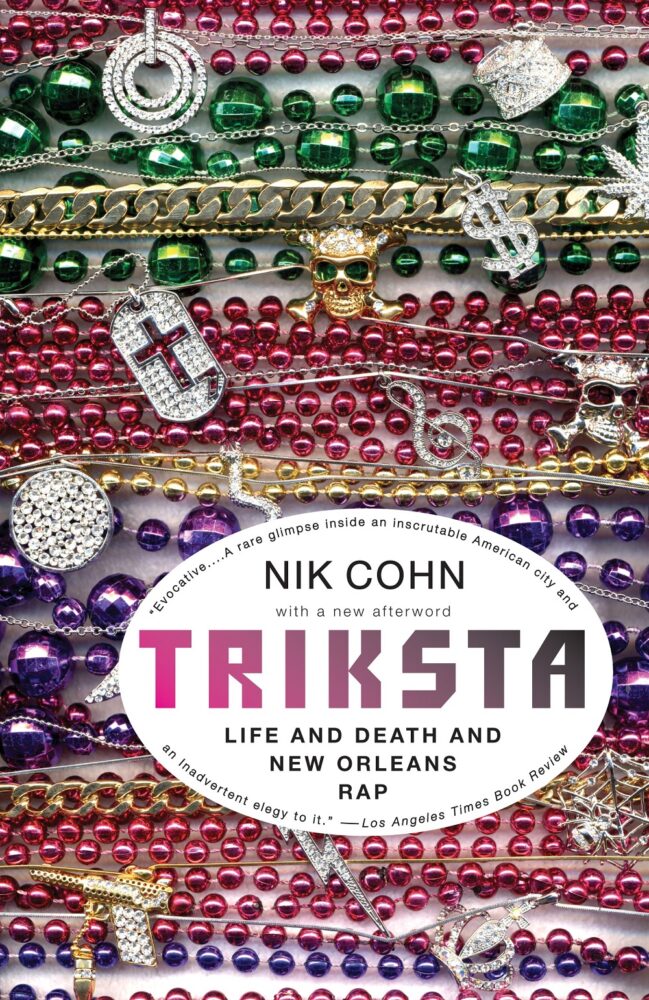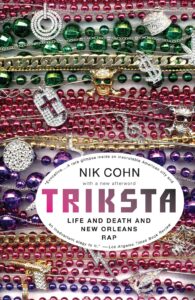Obsessed with New Orleans
Rock journalist Nik Cohn’s Triksta chronicles a chapter in the city’s hip hop history
Published: September 1, 2020
Last Updated: November 30, 2020

Penguin Random House
But I do remember what I read. I remember the lone, pocket-sized edition I tucked into the small bag of belongings I packed (Roger Shattuck’s The Banquet Years). I remember the book I read as my girlfriend and I drove north, three weeks—or was it four?—after Hurricane Katrina, the sensation of its deckle-cut pages furrowing my fingers (Cormac McCarthy’s No Country for Old Men). I can recall most of the books I purchased at The Strand months later, after resettling in New York, as I submersed myself in the literature and history of the city I presumed would never recover. And I remember discovering the book that I will forever associate with the storm and its long—still ongoing?—aftermath.
I remember reading, in the New York Times, about Nik Cohn’s Triksta, published just eleven weeks post-landfall. Remember diving into its pages in a tailspin of emotions. Remember raving about it to a friend like me exiled from the city we adored and missed and, yes, even resented. I remember Cohn’s words on the book’s first page and how they resonated with me, then and now. “I have been obsessed with New Orleans for most of my life,” he writes. “It is the place I’ve loved best on earth.”
I had never heard of the preeminent British music critic, a London-born, Northern Ireland–raised baby-boomer who had long harbored a mania for everything New Orleans—though I had, at several flashpoints in my life, absorbed the breadth of Cohn’s career. I knew the names of the American music writers incited to pick up the pen after devouring his 1969 essay collection, Awopbopaloobop Alopbamboom, a book that cemented his reputation as “the father of rock criticism.” I was familiar, as many of us might be, with three characters he helped create. An early novel about a celestial rock star, I Am Still the Greatest Says Johnny Angelo, likely inspired David Bowie’s alter ego Ziggy Stardust. After listening to a dreadful early demo of Pete Townshend’s in-the-works rock opera, Cohn suggested that he take a look at a follow-up novel he had written about a teenage pinball wizard. Voila! The Who’s Tommy. Always on the move, Cohn followed the action to disco-soaked New York and wrote the essay that would be adapted into the film Saturday Night Fever. And then he landed in New Orleans, in 2000, the same year I had.
The parallels stop there. Cohn had by then fallen deep for hip-hop culture. The rock music that brought him fame was “ruled by windbags,” he writes in Triksta, and rap had entered the new millennium not only ascendant but globally dominant. Though I was a hip-hop fan, able to differentiate between No Limit Soldiers and Cash Money Millionaires, I knew next to nothing about the rap world Cohn chronicles, a loose coterie of smalltime record label kingpins and sound booth strivers. A bounce-scene super fan, Cohn amassed the slew of self-released mixtapes that back then flooded the city with beats, rhymes, and bass.
Perhaps unwilling to allow others to capitalize on his ideas, Cohn set out to not only document the local rap game but to become, in true immersion-style journalism, a minor player. These were the waning days of the major record label industry, the brief spell when Napster and traditional CDs cohabited, when the esteemed Warner Bros. music division could promise a quarter million to Cohn, a fifty-something-year-old white dude with an out-of-place accent, to talent scout in search of New Orleans’s next rap god, a pursuit he chronicles in Triksta.
Cohn’s first acquisition is Choppa, a mush-mouthed rapper fresh off a local smash that would be resurrected two decades later in the Saints locker room. An incompetent song writer but charismatic performer, Choppa snubs every idea Cohn tosses his way, including a dreadful Toby Keith–esque 9/11 anthem. Cohn redirects his energy into rawer talent, blue-collar dreamers with a rap side hustle—like Junie Bezel, aka Junie B, a second-grade school teacher with beaucoup stage charisma, and Che Muse, a socially conscious lyricist day-jobbing as a social worker. Though these collaborations never pan out, Cohn manages to score a handful of production credits on Choppa’s second album, earning himself a nickname: Nik da Trik, soon Triksta, for his wily ways.
Like few other books about New Orleans race and culture, Cohn manages to successfully document a place where, as the T-shirt says, everything you love is because of Black people. He admits to being a cultural gentrifier, just another “white besotted with Blackness” who remains simultaneously “afraid of Blackness itself.” At the same time, he fails spectacularly at not recognizing the privilege of his whiteness, resulting in dimwitted sentences that portray the city’s institutional poverty as “heartachingly lovely” and its Black community as embracing an existence where “life came so cheap.”
Nik da Trik left New Orleans in 2004, prematurely ending a partnership with an upcoming rapper, and eventual superstar, named Kevin Gates. Cohn returned in the bitter months following Katrina to check in with his rap compadres, though I don’t know if he makes his way to the city much these days—I’d love to show him around the new New Orleans. Whether or not that comes to pass, I’ll no doubt keep returning to his memoir when those 2005 memories come flooding back. Though Triksta is not by any stretch a Katrina book, it remains my Katrina book, a reminder that sometimes we don’t pick our books, our books pick us.
Rien Fertel dedicates this column to his old friend, an original Triksta himself, John Stinson.
